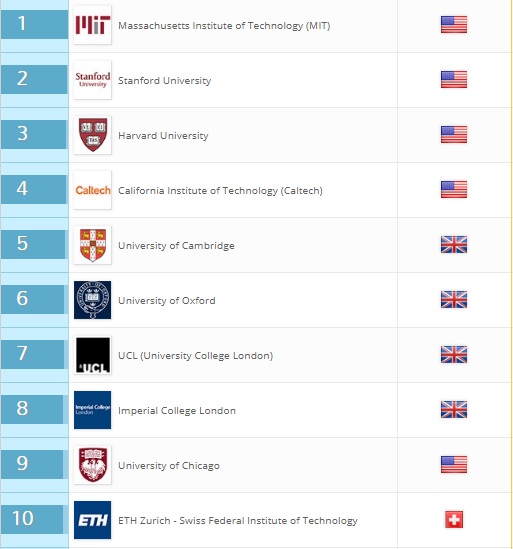QS World University Rankings 2018 released. What are the best universities
The 14th edition of the QS World University Rankings has been released, ranking over 950 universities from 84 different countries. Facing the results of the election and the start of Brexit negotiations, the UK also sees its universities continue to slide down the rankings, with 51 of 76 falling at least one place.
For the sixth year running, Massachusetts Institute of Technology (MIT) leads the way at the top of the rankings, closely followed by three other US universities (Stanford, Harvard and the California Institute of Technology). None of the 180 universities form the US and Canada include in the QS World University Rankings come close to matching the performance of MIT.
The Top 10 QS World Universities
“MIT has a network of successful alumni who make substantial donations to their alma mater and the power these connections grant the university cannot be overestimated. Other institutions are scrambling to catch up, but MIT has a 20-year head start so will be pretty difficult to dislodge,” Ben Sowter, Head of Division in the QS Intelligence Unit says.
Growing competition internationally is also making it harder for some U.S. institutions to attract international faculty and students. 21 of the top 50 universities in the US & Canada have fallen down the ranking since last year.
One of the competitors is Russia, as universities here have benefited from increased government funding and a concerted attempt to improve student mobility. And the results are showing: of the 24 universities from Russia included in this year’s ranking, only two have fallen compared to last year, while the others have either held firm or made impressive gains on their competition.
China also keeps climbing the rankings, having six universities in the top 100 for the first time ever. Zhejiang University and the University of Science and Technology in China are the new arrivals in the top 100. In total, China has nearly 50 universities in this year’s ranking.
In Europe, UK universities struggle for a second straight year although Cambridge, Oxford, UCL and Imperial all retain places in the top 10. Whether Brexit and the fall-out from the 2017 general election will make it harder still for UK universities to make international connections remains to be seen, and likely political changes in France, Germany and other European nations could cause plenty of shifts in the world of higher education in the years ahead. For now, many western European countries appear to be in rude health, with Italy in particular resurgent, thanks to two new entries in the top 200.
An obvious trend in this year’s rankings is the continued improvement of universities in less obvious parts of the world. In Latin America, for example, both Argentina and Brazil have seen a flagship university climb the ranking. Argentina’s Universidad de Buenos Aires is now ranked 75th, while the Universidade de Sāo Paulo in Brazil is up to 120th. In the Middle East, the top four universities in Saudi Arabia have all improved on last year’s positions.
